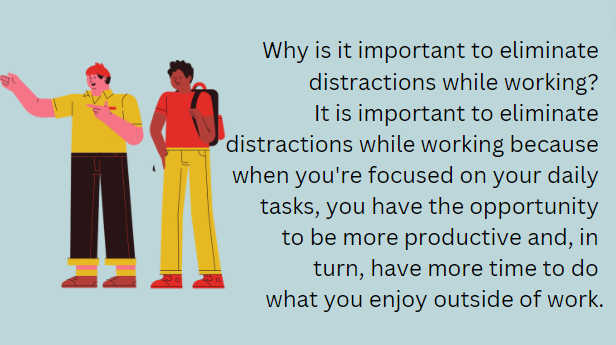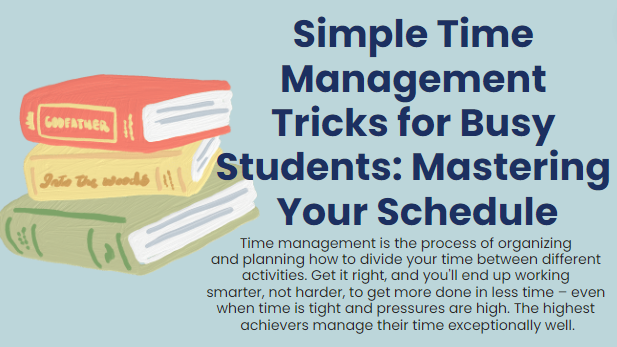As a student, juggling classes, assignments, extracurricular activities, and a social life can be overwhelming. Effective time management is crucial for academic success and maintaining a healthy work-life balance. This article will explore practical and easy-to-implement time management techniques tailored for busy students.
Why Time Management Matters for Students
- Reduces stress and anxiety
- Improves academic performance
- Allows for a balanced lifestyle
- Enhances productivity and efficiency
- Builds valuable life skills for future careers
Essential Time Management Techniques
1. Prioritize Your Tasks
One of the most critical aspects of time management is prioritizing your tasks. Use the Eisenhower Matrix to categorize your activities:
| Urgent | Not urgent |
| Important | Do first |
| Not important | Delegate |
- Do First: Tasks that are both urgent and important (e.g., upcoming exams, assignments due soon)
- Schedule: Important but not urgent tasks (e.g., long-term projects, regular study sessions)
- Delegate: Urgent but not important tasks (e.g., responding to non-critical emails, certain social commitments)
- Eliminate: Tasks that are neither urgent nor important (e.g., excessive social media use, procrastination activities)
2. Create a Realistic Schedule
Develop a weekly schedule that includes all your commitments:
- Start with fixed commitments (classes, work shifts)
- Add study time for each subject
- Include time for assignments and projects
- Schedule breaks and leisure activities
- Leave some buffer time for unexpected tasks
Remember to be realistic and allow flexibility in your schedule.
See also>> The Remarkable Transformation of Your Life Through Gratitude
3. Use the Pomodoro Technique
The Pomodoro Technique is an excellent method for maintaining focus and preventing burnout:
- Choose a task to work on
- Set a timer for 25 minutes
- Work on the task until the timer rings
- Take a 5-minute break
- Repeat steps 1-4 four times
- After four cycles, take a longer break (15-30 minutes)
This technique helps you stay focused and prevents mental fatigue by incorporating regular breaks.
4. Utilize Technology
Leverage technology to enhance your time management skills:
- Digital calendars (Google Calendar, Apple Calendar)
- Task management apps (Todoist, Trello, Asana)
- Time tracking apps (RescueTime, Toggl)
- Focus apps (Forest, Freedom)
These tools can help you stay organized, track your time, and minimize distractions.
5. Practice the Two-Minute Rule
Implement the Two-Minute Rule to increase productivity:
- If a task takes less than two minutes to complete, do it immediately
- Examples: Responding to a quick email, tidying up your desk, or reviewing a short set of flashcards
This technique prevents small tasks from piling up and becoming overwhelming.

See also>> Why Networking is Key to Your Professional Growth: Unlocking Career Success Through Connections
6. Use Time Blocking
Time blocking involves dedicating specific time slots to particular tasks or types of work:
- Identify your most productive hours
- Allocate challenging tasks to your peak productivity periods
- Group similar tasks together
- Schedule breaks between blocks
- Review and adjust your time blocks regularly
Here’s an example of a time-blocked schedule:
| Time | Activity |
| 8:00 AM – 10:00 AM | Study for upcoming exams |
| 10:15 AM – 11:45 AM | Attend lecture |
| 12:00 PM – 1:00 PM | Lunch and short break |
| 1:15 PM – 3:15 PM | Work on assignment |
| 3:30 PM – 5:00 PM | Extra curricular activity |
| 5:15 PM – 6:15 PM | Review class notes |
| 6:30 PM – 8:00 PM | Dinner and relaxation |
| 8:15 PM – 9:45 PM | Reading and preparation for tomorrow |
7. Learn to Say No
As a busy student, it’s essential to set boundaries and learn to decline non-essential commitments:
- Assess the value and importance of each request
- Consider your current workload and priorities
- Politely decline if the commitment doesn’t align with your goals
- Offer alternatives or compromises when possible
Remember, saying no to less important tasks allows you to say yes to what truly matters.
8. Minimize Distractions
Identify and eliminate common distractions to improve your focus:
- Turn off notifications on your devices
- Use website blockers during study sessions
- Find a quiet study space
- Communicate your need for uninterrupted time to friends and family
- Keep your study area clean and organized

9. Use Active Study Techniques
Maximize your study time by using active learning methods:
- Summarize key points in your own words
- Create mind maps or diagrams
- Teach concepts to others
- Use flashcards for quick reviews
- Practice problem-solving instead of passive reading
These techniques help you retain information more effectively and make the most of your study sessions.
10. Review and Adjust Regularly
Continuously evaluate and improve your time management strategies:
- Set aside time each week to review your progress
- Identify areas where you struggled with time management
- Celebrate successes and acknowledge improvements
- Adjust your techniques and schedule as needed
- Stay open to trying new time management methods
Overcoming Common Time Management Challenges
| Challenges | Solution |
| Procrastination | Break tasks into smaller, manageable steps |
| Overcommitment | Learn to prioritize and say no to non-essential activities |
| lack of motivation | set clear goals and reward yourself for achievements |
| Poor planning | Use digital tools to create and stick to schedules |
| Distractions | Identify and minimize sources of interruption |
See also>> Why Networking is Key to Your Professional Growth: Unlocking Career Success Through Connections
FAQs
Q: How can I stay motivated to stick to my schedule?
A: Set clear goals, reward yourself for achievements, and visualize the benefits of good time management.
Q: What should I do if I fall behind on my schedule?
A: Don’t panic. Reassess your priorities, adjust your schedule, and focus on getting back on track gradually.
Q: How do I balance study time with socializing and self-care?
A: Use time blocking to allocate specific periods for studying, socializing, and self-care activities. Maintain a balanced schedule that includes all aspects of your life.
Q: Is it better to study in long blocks or shorter sessions?
A: Most students benefit from shorter, focused study sessions with breaks in between, like the Pomodoro Technique. However, find what works best for you.
Q: How can I avoid burnout while managing my time effectively?
A: Incorporate regular breaks, practice self-care, and ensure you’re getting enough sleep. Don’t overcommit yourself, and learn to say no when necessary.
Q: What’s the best way to handle unexpected tasks or emergencies?
A: Build some buffer time into your schedule for unexpected events. When emergencies arise, reassess your priorities and adjust your schedule accordingly.
Q: How can I improve my focus during study sessions?
A: Minimize distractions, use active study techniques, and try methods like the Pomodoro Technique to maintain concentration.
Q: Is it okay to adjust my schedule frequently?
A: Yes, it’s important to be flexible and adjust your schedule as needed. Regular review and adaptation are key to effective time management.
Conclusion
Effective time management is a crucial skill for busy students to master. By implementing these simple yet powerful techniques, you can reduce stress, improve your academic performance, and maintain a healthy balance in your life. Remember that developing good time management habits takes practice and patience. Start with a few strategies that resonate with you, and gradually incorporate more as you become comfortable. With consistent effort, you’ll find yourself better equipped to handle the demands of student life and set yourself up for success in your future endeavors.
